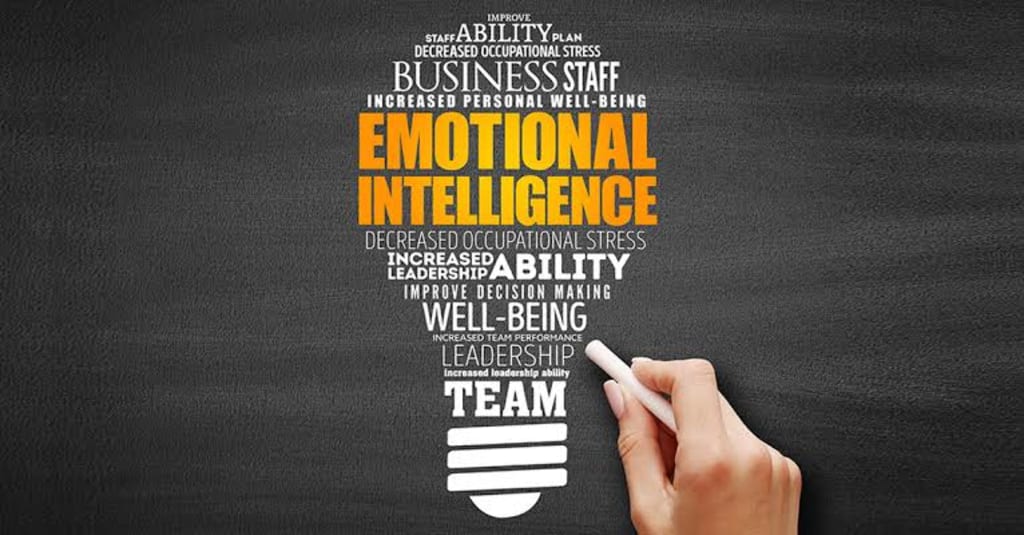Emotional intelligence in leadership.
Importance of emotional intelligence in leadership.

Introduction
Leadership is a critical aspect of any organization, and it requires a range of skills to be successful. While traditional leadership models have focused on qualities such as intelligence, competence, and experience, there is growing recognition of the importance of emotional intelligence in leadership. Emotional intelligence refers to the ability to understand and manage one's emotions, as well as the emotions of others. In this article, we will explore the importance of emotional intelligence in leadership and how it can be developed.
What is Emotional Intelligence?
Emotional intelligence is a set of skills that allow individuals to perceive, understand, and manage emotions. It includes the ability to recognize one's own emotions and to use that information to guide decision-making and behavior. It also involves the capacity to understand the emotions of others and to use that understanding to build relationships, communicate effectively, and resolve conflicts.
The concept of emotional intelligence was first introduced by psychologists Peter Salovey and John Mayer in the 1990s. They argued that emotional intelligence was a distinct form of intelligence that could be measured and developed. Since then, emotional intelligence has become a widely recognized concept, and research has shown that it is a critical factor in leadership effectiveness.
The Importance of Emotional Intelligence in Leadership
Effective leadership requires more than just technical skills and knowledge. Leaders must also be able to inspire and motivate their team, communicate effectively, and build strong relationships. Emotional intelligence is critical to all of these aspects of leadership, and there is growing evidence that it is a better predictor of leadership success than traditional measures such as IQ.
One of the most significant ways that emotional intelligence impacts leadership is through the ability to build and maintain relationships. Leaders who have high emotional intelligence are better able to connect with their team members and to create a positive work environment. They are more attuned to the needs and concerns of their employees, and they are better able to communicate effectively and resolve conflicts.
Emotional intelligence is also important in decision-making. Leaders who are able to understand and manage their emotions are less likely to make impulsive or reactive decisions. They are better able to think critically and consider a range of perspectives, which can lead to better outcomes. Moreover, leaders with high emotional intelligence are better able to manage stress and to maintain a positive attitude, which can be critical in challenging situations.
Emotional intelligence (EI) is the ability to recognize, understand, and manage emotions in oneself and others. It is a critical aspect of human behavior that can lead to personal and professional success. Here are the subheadings that can help you understand the concept of emotional intelligence:
Self-awareness: Self-awareness is the ability to recognize and understand one's emotions, strengths, weaknesses, values, and goals. It is the first step towards developing emotional intelligence. Self-aware individuals can recognize how their emotions affect their thoughts, behavior, and relationships.
Self-regulation: Self-regulation is the ability to manage one's emotions, thoughts, and behaviors effectively. It involves controlling impulsive behaviors, adapting to changing circumstances, and being resilient in the face of adversity. Self-regulated individuals can regulate their emotions, even in difficult situations.
Motivation: Motivation is the driving force behind human behavior. Motivated individuals are persistent, optimistic, and have a strong desire to achieve their goals. They are driven by intrinsic motivation, such as a sense of purpose or personal fulfillment, rather than external rewards.
Empathy: Empathy is the ability to understand and share the feelings of others. Empathetic individuals can recognize and respond to the emotional needs of others. They are skilled at communicating effectively, building relationships, and resolving conflicts.
Social skills: Social skills are the abilities that facilitate effective communication, collaboration, and teamwork. Socially skilled individuals can build rapport with others, inspire and influence others, and resolve conflicts effectively. They are skilled at networking, negotiation, and leadership.
Developing Emotional Intelligence in Leaders
While emotional intelligence is an innate ability to some extent, it can also be developed and enhanced through training and practice. There are a range of strategies that leaders can use to improve their emotional intelligence, including:
Self-reflection: Leaders can improve their emotional intelligence by reflecting on their own emotions and the impact that they have on their behavior. This can involve keeping a journal, practicing mindfulness, or seeking feedback from others.
Active Listening: Leaders can improve their emotional intelligence by practicing active listening. This involves fully focusing on the person speaking, asking open-ended questions, and providing non-judgmental responses.
Leaders can improve their emotional intelligence by developing empathy. This involves trying to understand the perspective of others and recognizing the emotions that they are feeling.
Conflict Resolution: Leaders can improve their emotional intelligence by developing conflict resolution skills. This involves remaining calm, focusing on the underlying issues, and finding solutions that meet the needs of all parties.
Emotional intelligence has gained significant attention in recent years because of its impact on various aspects of life, including personal relationships, career success, and mental health. It has been found that individuals with higher levels of emotional intelligence tend to have better mental and physical health, stronger relationships, and more fulfilling careers.
Research suggests that emotional intelligence can be developed and improved over time through various techniques, such as self-reflection, mindfulness, cognitive-behavioral therapy, and emotional intelligence training. Developing emotional intelligence can lead to numerous benefits, including improved communication skills, increased self-awareness, better decision-making, and stronger interpersonal relationships.
Emotional intelligence can also be broken down into different components or factors, depending on the model being used. One of the most popular models of emotional intelligence is the one proposed by Daniel Goleman, which includes four components: self-awareness, self-management, social awareness, and relationship management.
Other models of emotional intelligence may include additional components, such as emotional expression, emotional regulation, emotional empathy, and emotional self-efficacy. However, regardless of the specific model being used, emotional intelligence generally refers to the ability to recognize, understand, and manage emotions in oneself and others.
Emotional intelligence is a vital aspect of human behavior that can lead to personal and professional success. Developing emotional intelligence can improve communication skills, increase self-awareness, and foster better relationships. Emotional intelligence can also be broken down into different components or factors, and it can be developed and improved over time through various techniques.
Conclusion
Emotional intelligence is a critical factor in leadership effectiveness. Leaders who are able to understand and manage their own emotions, as well as the emotions of others, are better able to build strong relationships, make effective decisions, and create a positive work environment. While emotional intelligence is a complex skill, it can be developed and enhanced through training and practice. By investing in emotional intelligence development, organizations can help their leaders to become more effective and better able to achieve their goals.
About the Creator
Amirtha jeeva
Hi, I'm Amirtha, an avid article writer and contributor on the Vocal Media platform. I have always had a passion for writing and love to share my thoughts and ideas with others through my articles.
Enjoyed the story? Support the Creator.
Subscribe for free to receive all their stories in your feed. You could also pledge your support or give them a one-off tip, letting them know you appreciate their work.





Comments
There are no comments for this story
Be the first to respond and start the conversation.